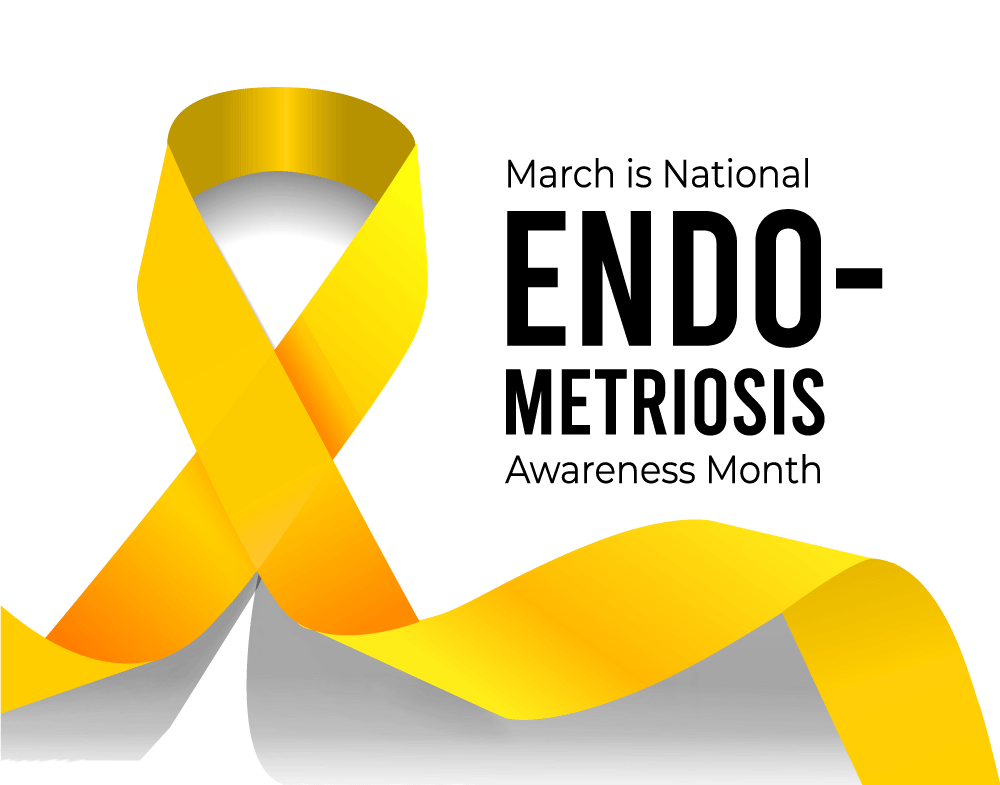Endometriosis
Overview
Endometriosis is a common gynaecological condition where tissue similar to the endometrium (that lines the inside of the uterus) also grows on the outside of uterus causing pain and discomfort.
Endometriosis most commonly occurs in the pelvis and can affect a woman's reproductive organs. Treatment of endometriosis includes many options including lifestyle, pain-relief medications, hormone therapy, and surgery, and often a combined approach is required. Often women have questions about the effect of endometriosis on their fertility, bladder and bowel, emotional health and relationships.
Jump to:

What is Endometriosis?
Endometriosis is a condition that affects 1 in 10 women of reproductive age but is more common in women who have symptoms.
Endometriosis is a condition where cells that line the inside of the uterus are also present on other organs in the pelvis. Like endometrial tissue, these cells can bleed during the menstrual cycle, which can cause inflammation, scarring, and damage to other organs. This can lead to painful periods, painful sex, chronic pain, and infertility. Symptoms can range from minimal to severely debilitating, and often get worse over time.
Endometriosis can also grow inside ovaries. When endometriosis grows inside ovaries, it can cause cysts called endometrioma’s or chocolate cysts, because of the dark blood they contain. These cysts in particular can affect your fertility or cause persistent pain and tend to be associated with more severe endometriosis.
Symptoms of Endometriosis
Some the most common symptoms you may suffer from endometriosis are:
- Pelvic pain including painful periods (Dysmenorrhoea) and pelvic pain
- Lower back pain during menstrual cycles
- Painful sex
- Infertility
- Ovarian cysts or masses
Painful periods or Dysmenorrhea associated with endometriosis is often dull or crampy pelvic pain that typically begins one to two days before menses, persists throughout menses, and can continue for several days afterward. Pelvic pain is typically chronic and described as dull, throbbing, sharp, and/or burning.
Other endometriosis symptoms include bladder urgency, bowel problems, rectal pain particularly with periods, bloating, nausea, low back pain, or chronic fatigue. An increased number of symptoms has been associated with increased likelihood of endometriosis.
If you suffer from any of these symptoms and want to see a gynaecologist that specialises in endometriosis, contact the team at Nurture Gynaecology today for a private consultation and discussion.


With Nurture Gynaecology, our North Brisbane patients (as well as those throughout Queensland), can be assured that they are in a warm, welcoming and safe environment to share all their health concerns, regardless of their age or where they’re at in life.
To find out more about the services we offer or to book a gynaecologist appointment, contact us today for a confidential discussion.
Diagnosis of Endometriosis
The only way that Endometriosis can be definitively diagnosed is by laparoscopy. A Laparoscopy is a procedure that allows a gynaecologist to look inside at your organs in your abdomen and pelvis. A laparoscope is a small camera which is inserted through a small incision in the abdomen. Laparoscopy is also known as keyhole surgery or minimally invasive surgery.
Laparoscopy shows the extent of the condition and allows the endometriosis to be removed. It also allows it to be “scored” as:
- Stage 1 (minimal disease)
- Stage 2 (mild)
- Stage 3 (moderate disease)
- Stage 4 (severe disease)

Treatment of Endometriosis
Endometriosis is a chronic gynaecological condition, that with expert gynaecology involvement and multidisciplinary care can be managed. Therapies for endometriosis-related pelvic pain include analgesics, hormonal treatments, and surgical intervention, and a combined approach is often used.
In women with only mild symptoms, management options including non-steroidal pain relief and hormonal medications. Women with mild endometriosis may respond to medical therapy alone. Women whose pain does not respond to the above treatments may require a laparoscopy for confirmation of the diagnosis and treatment surgical excision.
Indications for surgical treatment include diagnosis of persistent pelvic pain that does not respond to medical therapy, evaluation of severe symptoms that limit function, infertility and treatment of endometriomas. Most women, achieve pain relief after surgery if their disease is completely removed with surgery alone. However, with or without further treatment recurrence can occur and hence the need for follow-up care.
Multidisciplinary and holistic care is very important with ongoing management after a Laparoscopic excision of endometriosis. This includes pain management, post operative hormonal medication to reduce symptom recurrence and avoid the need for multiple surgeries, and involvement of other specialists such as a pelvic floor physiotherapist.
If you have a condition such as endometriosis, it is important you see a Gynaecologist that has an interest in and specialises in Endometriosis. If you have endometriosis, you will be in the best hands with Dr Brooke O’Brien. She is committed to seeing you through your journey and back to good health.
Resources
Jean Hailes Foundation: Endometriosis
Pelvic Pain Australia
https://endometriosis.org/
Contact Us
At Nurture Gynaecology, Dr Brooke O’Brien and her team value honesty, compassion and making our patients feel as at home as possible when they come to see us at the clinic. If this is something you also value, we invite you to book a consultation at our clinic today to find out how we can help you.
Contact us today to book your gynaecologist appointment with Dr Brooke O’Brien.
Book Your Endometriosis Appointment Online
© 2022 Nurture Gynaecology | All Rights Reserved. | Privacy Policy | Sitemap
Developed by Procloud - Web Design Agency, Signage Brisbane